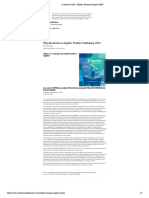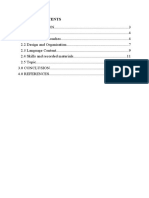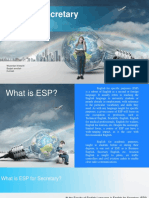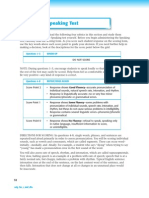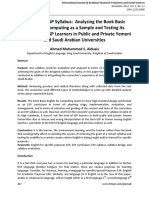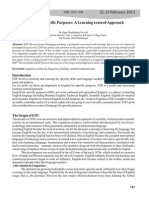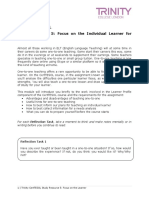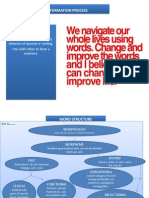ESP, Need Analysis
ESP, Need Analysis
Uploaded by
Imran MaqsoodCopyright:
Available Formats
ESP, Need Analysis
ESP, Need Analysis
Uploaded by
Imran MaqsoodOriginal Description:
Copyright
Available Formats
Share this document
Did you find this document useful?
Is this content inappropriate?
Copyright:
Available Formats
ESP, Need Analysis
ESP, Need Analysis
Uploaded by
Imran MaqsoodCopyright:
Available Formats
Introduction
Of all the languages in the world, English is considered to be the most widely used
language in all over the world. In this modern era, English is considered to be a
world language because most of the world knowledge is enshrined in it. As English
is more importantly a language of science & technology and economic
development so it opens up a number of opportunities for its competent users
regardless of their nationality, color and ethnicity etc.
The denouement of the second world war in 1945 quirked the trends of English
language learning and learners. Such an anomaly grew the demand of tailored
courses according to the specific needs of English language learners as the learners
motivation for learning English was no more for pleasure and prestige of the
language. The world had identified a room for an international language which
could prove to be a passport to scientific, technological and economic gains and
this language was English. English language heralded prosperity while catering the
specific needs of people in different regions of the world.
This research project focuses on English for occupational Purposes which is
another narrowed form of English for Specific Purposes. The researchers have
handpicked a group of hotel receptionists as a population and receptionists of Pearl
Continental Lahore, Pakistan as their sample. The researchers decided to consider
this group because it is their job requirement to be good at English as they have to
deal with multinational guests everyday being employed in a five star hotel.
English for Specific Purposes
English for specific purposes is a multidisciplinary approach. English for Specific
Purposes (ESP) has become a very popular subject in the recent years. Research
has discovered that ESP is an indispensable and advantageous field, with ever
more people studying it around the world. .Since 1960 ESP has become imperative
and innovative activity within teaching ESL or EFL. "Tell me what you need
English for and I will tell you the English that you need," became the guiding
principle of ESP (Hutchinson and Waters, 1987: 8).
Definitions of ESP
ESP is: the teaching of English, not as an end in itself but as an essential means to
a clearly identifiable goal Mackay (1978:163).
Robinson (1991 ) defines ESP as normally goal directed , and that ESP
courses develop from a needs analysis , which aims to specify as closely as
possible what exactly it is that students have to do through the medium of
English
ESP must be seen as an approach to language learning (not as a product) which
is based on learners need and directed by specific and apparent reasons for
learning. (Hutchinson and Waters, 1987 (Robinson, 1991:3)
Emergence of ESP
Huthinson &Waters enlisted three reasons common to the emergence of all ESP:
the demands of a brave new world
a revolution in linguistics
focus on the learner .
Classification of ESP
ESP has been divided into the following major areas:
1. English for Academic Purposes ( EAP )
2. English for Professional Purposes ( EPP )
3. English for Occupational Purposes ( EOP )
ESP deals with situations in which real world objectives require specific linguistic
competencies. There is a strong focus on language as situated language use. In
ESP , the specific needs of learners are distinguished as :
1 .Target Needs (Necessities + Lacks)
2. Learning Needs
Significance of ESP
ESP is highly cost-effective and a common denominator must be found .
Strevens summarizes the advantages of ESP with the following four points:
Being focused on the learners need, it wastes no time
It is relevant to the learner
It is successful in imparting learning
It more cost effective than General English.
ESP shows a dedication to the goal of facilitating language instruction that prefers
learners own specific learning purposes. It emphasizes learning by practicing and
verifies Hutchinson &Waters words, In theory nothing, in practice a great deal
Course Design
Course designing is a process which entails three steps: interpreting the raw data
about learning needs, producing an integrated series of teaching-learning
experiences and leading the learners to a particular state of knowledge.
Approaches to Course Design
There are three main approaches to course design: language-centered, skills-
centered and learning centered.
1. Language-centered Approach
This is one of the most familiar approach to English teachers which is particularly
prevalent in ESP. It draws a direct connection between the analysis of the target
situation and the content of the ESP course yet learner restricted not learner
centered.
2. Skills centered Approach
This approach aims at helping learners to develop skills and strategies which
remain continued after the ESP course by making learners better processors of
information. The skills-centered approach has two basic principles: one theoretical,
and one pragmatic:
1. Theoretical hypothesis is that underling any language behavior are certain skills
and strategies, which the learner uses in order to produce or comprehend discourse.
2. The pragmatic basis for the skills-centered approach derives from a
distinction made by Widdowson between goal-oriented courses and process-
oriented courses. This approach focuses on competence at high level.
Learning-centered Approach
This approach is based upon the principle that learning is totally determined by the
learner who uses his knowledge and skills to make sense of new information and it
is not just a mental process but a process of negotiation between individuals and
society.
Syllabus Design
In Wilkins' (1981) words, syllabuses are "specifications of the content of language
teaching which have been submitted to some degree of structuring or ordering with
the aim of making teaching and learning a more effective process." A syllabus can
also be seen as "a plan of what is to be achieved through our teaching and our
students' learning" (Breen, 1984a) while its function is "to specify what is to be
taught and in what order" (Prabhu, 1984). Hutchinson and Waters (1987:80)
define syllabus as at its simplest level as a statement of what is to be learnt. They
further add that it reflects of language and linguistic performance. Yalden (1987:
87) also refers to syllabus as a "summary of the content to which learners will be
exposed". (What to teach) and linguistic matter (how to teach
Types of syllabuses
1. Procedural
2. Cultural
3. Situational
4. Skill Based
5. Task Based
6. Structural
7. Multi-Dimensional
8. Content Based
9. Process
10. Learner led
11. Functional Notional
12. Proportional
13. Lexical
Course Design for Hotel Receptionists
The domain of this course comes under the realm of English for Occupational
Purposes (EOP). The essay particularly caters to the professional requirements of
hotel receptionists in Pearl Continental Hotel, Lahore.
In the 21 century , tourism has prompted the hospitality industry to soar
rapidly. . English is the most commonly used language of hospitality industry and
lingua franca of tourists all over the world. Hospitality industry gives ample
importance to effective communication skills.
A hotel receptionist performs crucial role within hotel by being the first person a
client encounters. He can have a tremendous impact on guests and represents the
true face of the hotel as an ambassador. The hotel receptionists require a
specific language to communicate properly with the guests while performing
different functions . Furthermore , they have to master the variation in
English in terms of word choice , grammar , pronouns, spelling and register
varieties They communicate with guests who are from different cultural
backgrounds . This particular scenario demands for learning specific English
language.
There has been a rapid growth in English courses aimed at specific disciplines
which emphasize the importance of the learners and their learning attitudes (e.g.
English for Hospitality instead of the more traditional 'General English' courses).
Harun and Blue ( 2003 ) in their study on the language needs of hospitality
students concluded that the hospitality industry entails a specific type of
language that is the hospitality language. According to research carried out
by the Educational institute of the American hotels and Motels association in
1996 , training could improve the reception department most effectively .
Thus , the receptionists should be exposed to apt methods of having good
interpersonal skills . Guests who encountered problems will become more
irritated when communication is another added issue to their problems. To ensure
the success of the hotel's mission statement of achieving zero complaints, there is
thus the need to ensure that communicative issues should run smoothly. Moreover,
the guests bring different backgrounds, needs, and value to the communication
setting (Richard, 1981 p.87). According to Mehta & Mehta (2007) recent research
on communication skills suggested that good communication skills are the keys to
unlock the doors of successes.
Need Analysis
Need analysis is the keystone of ESP and leads to a much focused course .It is the
process of establishing the what and how of the course. It results in the
awareness of target situation. In ESP, each course is preceded by need analysis
which makes it exclusive .Needs can be classified as:
Necessities: What the learner needs to perform effectively in the target
situation.
Lacks: The gap between the target proficiency and the present performance.
Wants: What the learners want or feel they need.
Munby (1978 ) , Mackay (1978) , Richterich and Chancerel ( 1980 ) , Chambers
(1980 ), and Hutchinson and Waters (1987 ) refer to needs analysis as target
situation analysis ( TSA ). A needs analysis can be defined as the systematic
collection and analysis of all subjective and objective information necessary to
define and validate defensible curriculum purposes (Robinson, 1991, p.36) used for
understanding the target situation in which ESP teacher will operate within a
particular institutional context. Need analysis is also used for analyzing the
discourse of the target situation, determining student learning strategies and
devising syllabus, courses, materials that happened in certain institution
(Krismawanti, 1993 ) . Another researcher, Mc Donugh (1984:34) and MacKay
(1978: 75) said that a needs analysis is very important to find out what language
skills and specific purposes in terms of operational skills that are needed for
successful performance of task.
Hutchinson and Waters (1987: 99) and Robinson (1991) divided the types of needs
into subjective needs and objectives needs .Subjective needs includes affective
factors, expectations, wants, cognitive styles, and learning strategy. Objective
needs include information about learners needs such as personal data, pattern of
language and language proficiency, and Language problems. The need has two
basic distinctions; target needs and learning needs. Based on Hutchinson and
Waters (1984), target needs means what the learner needs to do in the target
situation and learning needs means what the learner needs to do in order to
learn.
Hutchinson and Waters argued that if the learners, sponsors and teachers know
why learners need English, that awareness will have influence on what will be
accepted as reasonable content in the course and what potential can be exploited.
Target need analysis and Present situation analysis were conducted to determine
the needs of hotel receptionists in Pearl Continental Hotel, Lahore.
Methodology
The technique of triangulation was employed for this research. The questionnaires
were floated amongst receptionists of Pearl Continental Hotel, Lahore. The
participants were interviewed by the researchers to investigate the recurring
problems, while performing different functions during their jobs. The researchers
visited the hotel thrice to observe their daily routine meticulously without
disturbing them and held informal conversation with them after their duty hours.
Population
All the hotel receptionists from five star hotels in Pakistan comprise the population
of this study.
Sample
Twenty four hotel receptionists from Peal continental Hotel, Lahore were selected
for this study by doing convenient sampling. Most of them were graduates. They
belonged to middle class socio-economic back ground and enjoyed intermediate
level of their English proficiency along with their mother tongue i.e. Urdu.
Research Tools
The following research tools were used for data collection by employing
triangulation technique.
i- Questionnaires
Twenty four questionnaires were administered amongst them to get objective data
by asking multiple choice questions. The results of collected data were analyzed
statistically.
ii- Interviews
The researchers conducted the interview of four receptionists. The data was
collected by conducting in-depth structured interviews, going for 5-10 minutes
privately. During interview, open ended questions were asked to extract maximum
information. These interviews were recorded with the consent of participants to
assure reliability and avoid controversies. The confidentiality of responses was
assured. The participants talked about the linguistic barriers faced by them during
job. These interviews were later transcribed for better understanding.
iii- Observation
The observation was also rendered as a significant technique to get unbiased
information. It proved to be a significant tool for gathering data. The researchers
enlisted their findings on the basis of these three tools. In the light of these
findings, some recommendations are made. These recommendations served as
starting point for designing this ESP course.
Data Analysis
Data analysis plays significant role to determine findings. The data obtained from
questionnaires was analyzed statistically and demonstrated by graphs. The
interviews were tape recorded and then transcribed later.
Q 1: How often do you need English in the following Situations?
1- Never 2-Rarely 3-Often 4-Usually 5-Always
This question focuses the usage of English by hotel receptionists while performing
different functions during their job. Most of the participants (83.33%) considered
that greeting customers always demands optimum use of English.50% of
receptionists thought it necessary while registering check in check outs and
cancelations, whereas 54.16% responded that giving directions always needed
English.66.66% respondents were of view that they always had to use English
while answering telephones. Answering complaints was not mentioned as a major
function to be performed by participants and mixed response was recorded.
Greeting
Customers
Check ins, check
outs
Giving directions
Answering the
phone
Answering
complaints
Never 0% 25% 0% 0% 0%
Rarely 0% 0% 8.33% 0% 12.50%
Often 0% 0% 8.33% 16.33% 12.50%
Usually 16.66% 25% 29.16% 16.66% 25%
Always 83.34% 50% 54.16% 66.66% 25%
0%
10%
20%
30%
40%
50%
60%
70%
80%
90%
33% of hotel receptionists responded that they always used English for resolving
complaints, while 37% usually used it for the same purpose. English was not
considered as primary means for taking messages as only 25% realized its all the
time usage during their job. Use of English while managing front desk was
mentioned by majority (66.66%) and its usage for managing payments was
accepted by 50% and other 50 % declined its importance. Organizing paper work
was considered as an activity which required relatively less English use.
Do you speak English with local guests?
1- Never 2-Rarely 3-Often 4-Usually 5-Always
Resolving
Complaints
Taking messages
Managing front
desk
Managing
payments
Organizing
paperwork
Never 0% 16.66% 0% 50% 25%
Rarely 12.50% 8.33% 8.33% 0% 16.66%
Often 16.66% 25% 12.50% 0% 8.33%
Usually 37.50% 25% 12.50% 0% 16.66%
Always 33.33% 25% 66.66% 50% 33.33%
0%
10%
20%
30%
40%
50%
60%
70%
Most of the respondents (50%) answered that they often speak English with local
guests.
Do you have to identify various accents?
1- Never 2-Rarely 3-Often 4-Usually 5-Always
Most of the receptionists (45.83%) realized that identification of various accents is
essential the part of their job description.
0% 0%
20.83%
33.33%
45.83%
Never Rarely Often Usually Always
Identifying various accents
rarely
often
usually
always
0.00%
10.00%
20.00%
30.00%
40.00%
50.00%
rarely
often
usually
always
Do you have problem in identifying various accents?
1- Never 2-Rarely 3-Often 4-Usually 5-Always
Majority of respondents (62.5%) realized that they always faced great problems in
identifying various accents
Which language skill is used the most at your position?
1- Never 2-Rarely 3-Often 4-Usually 5-Always
In response to this question most of participants admitted that speaking (75%) and
listening (50%) are the mostly used skills during their jobs, on the contrary reading
and writing are less focused skills.
0% 0%
12.50%
25%
62.50%
Never Rarely Often Usually Always
Problems in identifying accents
Listening Speaking Reading Writing
Never 0% 0% 4.16% 0%
Rarely 0% 0% 66.66% 70.83%
Often 16.66% 0% 8.33% 4.16%
Usually 33.33% 25% 12.50% 12.50%
Always 50% 75% 8.33% 12.50%
0%
10%
20%
30%
40%
50%
60%
70%
80%
For language training which skill would you prefer to improve, tick the
appropriate option:
1-Speaking 2-Listening 3-Readin 4-Writing 5-Listening and Speaking
6-Reading and Writing 7- All four
In response to this question most of respondents showed their preference for
improving speaking and listening skills simultaneously, whereas no one showed
inclination for reading or writing skills.
Tick the appropriate option(s) which matches best with your
abilities/problems in the given situation
I can speak English:
1- Fluently 2- With hesitation3- With pauses 4- With long pauses to search for
suitable word
0.00%
10.00%
20.00%
30.00%
40.00%
50.00%
Percentage %
Percentage %
0%
10%
20%
30%
40%
50%
Fluently With
hesitation
With pauses With long
pauses to
search for
suitable words
I can speak English
I can speak English
45.83% respondents claimed that they could speak English with hesitation and25%
were confident that they can speak English fluently, rest of them could speak
English with pauses.
While speaking English, I have problem in:
1-Pronunciation 2-Accent 3-Fluency 4-Searching for correct expression
Most of the respondents (50%) considered fluency as a greatest obstacle in
speaking English and searching for correct expression was identified as second
most important factor with 20.83%.
While listening to English, I have difficulty in:
1-Understanding the fluent speakers 2-Understanding the speakers, who
speak at normal pace 3 -Understanding the slangs 4- Identifying the
specific information required
0.00%
10.00%
20.00%
30.00%
40.00%
50.00%
While speaking English, I have problem in
While speaking English, I have
problem in
Understanding slangs was mentioned by most of the participants (54.16%) as the
greatest hurdle while listening to English and understanding the fluent speakers
was identified as second major problem.
While writing English, I have difficulty in:
1-Grammar 2-Spelling 3-Vocabulary 4-Punctuation
Most of the receptionists (58.33%) faced difficulty in grammar and vocabulary was
considered as problem area by 25% respondents.
While reading English, I have difficulty in:
1-comprehension of the text 2-getting the overall meaning of the content
(skimming)
0%
10%
20%
30%
40%
50%
60%
Understanding the
fluent speakers
Understanding the
speakers, who
speak at normal
pace
Understanding the
slangs
Identifying the
specific
information
required
While listening to English ,I have problem in:
0.00%
10.00%
20.00%
30.00%
40.00%
50.00%
60.00%
Grammar Spelling Vocabulary Punctuation
While writing English, I have difficulty in
While writing English, I have
difficulty in
3- Taking out the specific piece of information 4- Guessing the meanings of un
familiar words
Guessing the meaning of unfamiliar words was main hurdle while reading for 33%
and 25% did not comprehend the text.
Findings
1-It was observed that most of the receptionists use Urdu with local guests.
2-They consider speaking as the most pivotal skill to be used during their job.
3-Listening is the second most significant skill for them.
4-There is no writing involved except filling the forms?
5-They face much difficulty in differentiating various accents.
6- They find it very difficult to communicate with Chinese guests.
7-Most of them cant speak fluently .They showed inhibition when they were
asked for an interview.
8-They speak English in pure Pakistani accent and mispronounce words.
9-Use of slangs by native speakers hampers their understanding mostly.
10-Sometimes they cant express themselves adequately due to lack of right
expression and appropriate register.
0%
5%
10%
15%
20%
25%
30%
35%
While reading English, I have difficulty in:
While reading English, I have
difficulty in:
13-They use very basic vocabulary and are not familiar with wide range of
courteous expressions.
Recommendations
1-They should be taught hospitality registers for performing various tasks.
2-They should be exposed to wide range of polite expressions for greeting
customers and answering queries.
3-They should be trained in telephonic communication skills.
4-They should be taught different functions through simulations.
5-They should be exposed to different varieties of English and various accents i.e.,
American, Canadian, and British to tune their ears. IELTS / TOEFL Listening
comprehension passages can be used for that purpose.
6-Different videos displaying target situations can be exploited to teach the
learners how to use appropriate vocabulary and expressions.
7-Role plays can b used to create interesting situations and teach situational
vocabulary.
Structural Functional Syllabus
On the basis of the findings from need analysis, the researchers find a narrow
angled structural functional syllabus the most suitable syllabus for their targeted
students. Functional notional syllabus is organized around communicative
functions such as: requesting, complaining, suggesting, and agreeing. In other
words, the content of the language teaching is a number of the functions that are
performed by using different structures. Functions and structures compliment and
enrich each other. They can be expressed by this equation:
Structure +context= function
Course Title : English for Hotel Receptionists
Course Participants : Five star Hotel Receptionists
Number of Participants : 24
Timing : 5-7 pm
Duration : 8 weeks (twice)
Venue : Pearl Continental Hotel, Lahore
Objectives of the Course
To develop communicative skills.
To use vocabulary, phrases and expressions at the appropriate level of
politeness.
To be fluent in the customary and routine expressions used in service.
To comprehend and respond to the basic needs of guests and perform
spontaneous face-to-face interaction.
To understand protocols in hospitality and tourism.
Learning Outcomes of the course
The learners will be able to communicate to the guests fluently and
effectively.
They will be able to make use of the learnt vocabulary items and
expressions.
They will be able to understand the customers requirements and fulfill
them.
They will be able to use polite expressions.
They will be able to demonstrate protocols in hospitality and tourism
Course Outline for English for Hotel Receptionists
1
15-
16
April
Greeting
s
Listenin
g
&
Speakin
g
1-
Welcoming
guests
2-
Exchanging
discourse
through
formal/infor
mal
expressions
Simple Present Tense
with Be verb.
Expressions for
greetings like Hi! ,
Hello, Good
morning/afternoon/eve
ning How are you this
morning? Whats up?
Hows it going? etc
Role play
between
receptionist and
the guest.
2 22-
24
April
Requests Reading
&
Speakin
g
1-Making
requests
2-Answreing
requests
Modal Verbs:
can, may, could, would
etc with please for
emphasizing requests
Transcript of a
dialogue between
receptionist and
the guest.
3 29-
30
April
Complai
nts
Listenin
g
&
Speakin
g
1-
Registering
complaints
2-Handling
complaints
Present, Past and
Future tense
(for listening to the
complaints,
understanding the time
when the problem rose
and then appropriate
auxiliary verbs for
responses)
Video recordings
of guests making
complaints and
the receptionist
resolving it.
4 06-
07
May
Permissi
on
Listenin
g
&
Speakin
g
1-Asking for
permission
2-Granting
permission
Modal Verbs:
can, could, may ,would
. If. & do you
mind ?etc
Games in pairs
and groups using
Verb cards and
actions
Role play
5 13- Hospitali Reading 1-Using Phrasal Verbs, Nouns 2 Lists of
14
May
ty
Register
,
Listenin
g &
Speakin
g
situational
vocabulary
2-Listing
jargons2
3-
Pronouncing
the words
correctly
& Adjectives and their
functions
hospitality
vocabulary can
be provided to the
students and there
can be a quiz
between two
groups.
Games:
Odd one out
Hangman
Making word
maps etc.
6 20-
21
May
Accent
Different
iation
Listenin
g
Identifying
various
accents
Stress & intonation
patterns
IELTS/TOEFL
recordings played
in the class for
focusing on
various accents
7 27-
28
May
Common
Slangs
Listenin
g
&
reading
Introducing
slang
language
Process of Conversion
& Derivation in slang
formation.
Real life situations
language.
Video of
teenagers
informal
gathering can be
played or samples
of teenagers
cyber language
can be brought to
the class
The students will
be asked to create
a dialogue using
these slang
words.
8 03-
04
June
Telepho
nic
Commun
ication
Listenin
g ,
Speakin
g &
Taking
Notes/
message
s
Describing
telephonic
communicati
on skills
Greetings and
Farewells
Introducing self and
organization
Modal Verbs for
requests, offers &
permissions
Simulation of
receptionists
making
reservations can
be done in the
class.
You might also like
- A Book I've Used - ETpedia Business English - MET PDFDocument2 pagesA Book I've Used - ETpedia Business English - MET PDFmariamcarullaNo ratings yet
- Questionnaire For English Course Design For Hotel ReceptionistDocument4 pagesQuestionnaire For English Course Design For Hotel ReceptionistIhsan Ibadurrahman100% (5)
- Chapter 1 - Assessment Concepts and IssuesDocument21 pagesChapter 1 - Assessment Concepts and IssuesRaita JuliahNo ratings yet
- Ielts Speaking Part Ii Describe A Person: Các đề tương tựDocument4 pagesIelts Speaking Part Ii Describe A Person: Các đề tương tựNguyễn PhúNo ratings yet
- Material EvaluationDocument16 pagesMaterial EvaluationSiti Aishah ZahirunNo ratings yet
- Working Mothers Risk Damaging Their ChildDocument12 pagesWorking Mothers Risk Damaging Their ChildImran MaqsoodNo ratings yet
- Target Situation Needs Analysis of Hotel Receptionists PDFDocument19 pagesTarget Situation Needs Analysis of Hotel Receptionists PDFĐào Ngọc Thuý0% (1)
- of ESP For Secretary Students On SMK 7 BatamDocument13 pagesof ESP For Secretary Students On SMK 7 BatamWulandari KristantiNo ratings yet
- Assignment Report WritingDocument5 pagesAssignment Report Writingkamran imtiazNo ratings yet
- English Language Course For ChefsDocument7 pagesEnglish Language Course For ChefsМаринаNo ratings yet
- Language Course Design Assessment PlanDocument5 pagesLanguage Course Design Assessment PlanĐỗ Quỳnh Trang100% (1)
- General Linguistics - Bùi Thị Mai Hoa - Homework 2Document8 pagesGeneral Linguistics - Bùi Thị Mai Hoa - Homework 2Thị Mai Hoa ĐàoNo ratings yet
- RPS Eng For Hotel N Tourism 2Document7 pagesRPS Eng For Hotel N Tourism 2Paradise PNo ratings yet
- Syllabus ESPDocument4 pagesSyllabus ESPJeane Dagatan100% (1)
- Tesol ReadingDocument7 pagesTesol ReadingWasif100% (1)
- Teaching Language SkillsDocument6 pagesTeaching Language Skillsfatihgun007No ratings yet
- Scoring The Speaking TestDocument4 pagesScoring The Speaking TestTogay Balik100% (8)
- Hoang Van Van - Renovation in Curriculum Design and Textbook DevelopmentDocument12 pagesHoang Van Van - Renovation in Curriculum Design and Textbook DevelopmentLinda Nguyen100% (1)
- A Framework For Teaching Grammar PDFDocument10 pagesA Framework For Teaching Grammar PDFMiko MikiNo ratings yet
- (John Read) Assessing Vocabulary (Cambridge LanguaDocument146 pages(John Read) Assessing Vocabulary (Cambridge Languahatamm1503No ratings yet
- An ESP Course For Tourism StudentsDocument15 pagesAn ESP Course For Tourism Studentsmnl3eNo ratings yet
- IELTS Speaking QuizDocument2 pagesIELTS Speaking Quizndpatel1No ratings yet
- Unit1 Section9Document3 pagesUnit1 Section9mcgwartNo ratings yet
- Slide Tefl 1Document104 pagesSlide Tefl 1Sephia PutryNo ratings yet
- FINAL ASSIGNMENT Material Evaluation and AdaptationDocument3 pagesFINAL ASSIGNMENT Material Evaluation and AdaptationAndi Annisa NurNo ratings yet
- Esp Course DesignDocument12 pagesEsp Course DesignElu Garcia100% (1)
- TEFL-TESOL. Unit 1. AssignmentDocument8 pagesTEFL-TESOL. Unit 1. Assignmentmaftunjon bakhtiyorovaNo ratings yet
- Yle CertificateDocument1 pageYle CertificatemaryzrgarNo ratings yet
- 18-Course Syllabus - Aun-Practical English 1Document12 pages18-Course Syllabus - Aun-Practical English 1Tran Anh VuNo ratings yet
- Evaluating and Adaptin Materials-Paul DickinsonDocument26 pagesEvaluating and Adaptin Materials-Paul DickinsonJoanne Lian Li FangNo ratings yet
- Bridgetefl BrochureDocument20 pagesBridgetefl Brochurem0eNo ratings yet
- CEFR Self Assessment Grid PDFDocument1 pageCEFR Self Assessment Grid PDFdldudzikNo ratings yet
- ESP Syllabus PDFDocument28 pagesESP Syllabus PDFJoseph R. GallenoNo ratings yet
- Contrastive Analysis - Refusing An Offer in Vietnamese and in EnglishDocument16 pagesContrastive Analysis - Refusing An Offer in Vietnamese and in EnglishNhi KhaNo ratings yet
- Welcome To The Key Subject Teaching English Grammar With AITDocument2 pagesWelcome To The Key Subject Teaching English Grammar With AITphamlinhNo ratings yet
- Introduction To Oral Communication Syllabus: Course & Faculty InformationDocument12 pagesIntroduction To Oral Communication Syllabus: Course & Faculty InformationPrincess Arrianne Tacadena100% (1)
- NNHDCDocument8 pagesNNHDCFresha VocadouNo ratings yet
- Lesson Plans-KetDocument2 pagesLesson Plans-KetHanhNo ratings yet
- Forecast Speaking Quý 1_2025 (Ielts Booster)Document27 pagesForecast Speaking Quý 1_2025 (Ielts Booster)nhihty2912No ratings yet
- A Curriculum Design For English For Tourism-PoppyDocument7 pagesA Curriculum Design For English For Tourism-PoppyIksan CahyanaNo ratings yet
- English For Specific Purposes A Learning Centred Approach - Review 1Document5 pagesEnglish For Specific Purposes A Learning Centred Approach - Review 1fzilocchiNo ratings yet
- Testing and Assessing ListeningDocument34 pagesTesting and Assessing ListeningHammad AlbariNo ratings yet
- MA Teaching GrammarDocument40 pagesMA Teaching GrammarRujak AsemNo ratings yet
- ESP Book Evaluation SakranDocument10 pagesESP Book Evaluation SakranOkaNo ratings yet
- Micro-Teaching Lesson PlanDocument3 pagesMicro-Teaching Lesson Planapi-487660366No ratings yet
- Unit 3Document6 pagesUnit 3Hội Gia sư Đà NẵngNo ratings yet
- Final Examination - Key: Course: Teaching MethodologyDocument2 pagesFinal Examination - Key: Course: Teaching MethodologyNguyễn Trần Bá ToànNo ratings yet
- 5 Focus On The Learner For CertTESOL PDFDocument6 pages5 Focus On The Learner For CertTESOL PDFPathum BuddhikaNo ratings yet
- ESP Pham Quynh AnhDocument6 pagesESP Pham Quynh AnhPhương PhươngNo ratings yet
- Need Analysis of EspDocument7 pagesNeed Analysis of EspUciha OngisnadeNo ratings yet
- Understanding The Learner - Trinity CertTESOLDocument7 pagesUnderstanding The Learner - Trinity CertTESOLsandhorac7453100% (2)
- Hanoi National University - 2Document23 pagesHanoi National University - 2Trang TrầnNo ratings yet
- Unit 2Document2 pagesUnit 2Hội Gia sư Đà NẵngNo ratings yet
- The Importance of Lesson PlanningDocument6 pagesThe Importance of Lesson Planningapi-338469786100% (2)
- Syllabus English For Nursing IVDocument5 pagesSyllabus English For Nursing IVYudi HaryadiNo ratings yet
- TBLT Lesson PlanDocument3 pagesTBLT Lesson PlanAnntonitte Jumao-asNo ratings yet
- IELTS Teacher Training Workshop-MorningDocument24 pagesIELTS Teacher Training Workshop-MorningThảo HanahNo ratings yet
- Module 2.an Overview of The New Tieng Anh TextbooksDocument1 pageModule 2.an Overview of The New Tieng Anh TextbooksThiet VoNo ratings yet
- English-Medium Instruction and Pronunciation: Exposure and Skills DevelopmentFrom EverandEnglish-Medium Instruction and Pronunciation: Exposure and Skills DevelopmentNo ratings yet
- Needs Analysis Final Assignment Siti ZahrahDocument16 pagesNeeds Analysis Final Assignment Siti ZahrahSiti zahrahNo ratings yet
- Importance of English LanguageDocument5 pagesImportance of English LanguageImran Maqsood100% (1)
- Registration FormDocument1 pageRegistration FormImran MaqsoodNo ratings yet
- Juxtaposition - What Is Juxtaposition?: Definition: Simply Stated, Juxtaposition Means Placing Things Side-ByDocument2 pagesJuxtaposition - What Is Juxtaposition?: Definition: Simply Stated, Juxtaposition Means Placing Things Side-ByImran MaqsoodNo ratings yet
- Words: Word Formation ProcessDocument15 pagesWords: Word Formation ProcessImran MaqsoodNo ratings yet
- Language Policy in PakistanDocument6 pagesLanguage Policy in PakistanImran MaqsoodNo ratings yet
- Importance of The English LanguageDocument13 pagesImportance of The English LanguageImran MaqsoodNo ratings yet
- Final 3000 Words ListDocument20 pagesFinal 3000 Words ListImran MaqsoodNo ratings yet
- Education Policy of MusharafDocument12 pagesEducation Policy of MusharafImran MaqsoodNo ratings yet
- Importance of The English LanguageDocument21 pagesImportance of The English LanguageImran Maqsood50% (2)
- General PrologueDocument22 pagesGeneral PrologueImran MaqsoodNo ratings yet
- Saxon Shore: From Wikipedia, The Free EncyclopediaDocument12 pagesSaxon Shore: From Wikipedia, The Free EncyclopediaImran MaqsoodNo ratings yet
- Old 2Document35 pagesOld 2Imran MaqsoodNo ratings yet
- Timeline of English HistoryDocument10 pagesTimeline of English HistoryImran MaqsoodNo ratings yet
- Recuperaciones Del Curso de Inglés.Document15 pagesRecuperaciones Del Curso de Inglés.Manuela vasquezNo ratings yet
- Dẫn luận ngôn ngữ bàiDocument4 pagesDẫn luận ngôn ngữ bàiThu HaNo ratings yet
- KSSR Lesson Plan: Mainstream: 1. Can Write Neatly The 3/3 Sentences TaughtDocument3 pagesKSSR Lesson Plan: Mainstream: 1. Can Write Neatly The 3/3 Sentences TaughtKhairul Nizam HamzahNo ratings yet
- Beginning English CurriculumDocument155 pagesBeginning English Curriculumvidales0723No ratings yet
- Self Observation LOG: Professor. Cristina PeñafortDocument7 pagesSelf Observation LOG: Professor. Cristina PeñafortKlau Rivera VarelaNo ratings yet
- Topic 4 - Teaching SpeakingDocument25 pagesTopic 4 - Teaching SpeakingMiftahul JannahNo ratings yet
- U3230366 11388 Grammar-EssayDocument13 pagesU3230366 11388 Grammar-EssayMỹ Linh TrầnNo ratings yet
- Exercises For Task 1 (English Grammar)Document5 pagesExercises For Task 1 (English Grammar)Shaista Cruz BencosmeNo ratings yet
- St. Joseph'S College (Autonomous), Devagiri, Calicut 8: Functional EnglishDocument77 pagesSt. Joseph'S College (Autonomous), Devagiri, Calicut 8: Functional EnglishKrinkyNo ratings yet
- Sample Basics Grammar Book PDFDocument9 pagesSample Basics Grammar Book PDFbissauNo ratings yet
- Scope and Sequence Academy PDFDocument33 pagesScope and Sequence Academy PDFCENTRO DE IDIOMAS UCSSNo ratings yet
- LCCI Information Manual 2021-22Document18 pagesLCCI Information Manual 2021-22Loir VenusNo ratings yet
- Road To GrammarDocument5 pagesRoad To GrammarBeth Wiens0% (1)
- Readings CAEDocument3 pagesReadings CAEAinhoa EgeaNo ratings yet
- 2222222222222222222Document2 pages2222222222222222222JacoNo ratings yet
- Community Module - June 2023Document62 pagesCommunity Module - June 2023Abody 7337No ratings yet
- 10 Ways To Sound More Polite When Speaking EnglishDocument36 pages10 Ways To Sound More Polite When Speaking EnglisharenaslauNo ratings yet
- Present Simple A2Document4 pagesPresent Simple A2Аня ДжабраиловаNo ratings yet
- EE2 Language Clinic 1Document15 pagesEE2 Language Clinic 1Cristina DavidNo ratings yet
- Memorandum of Law On The NameDocument24 pagesMemorandum of Law On The NameAntonius Block100% (1)
- 1edborines Page 1-40Document53 pages1edborines Page 1-40Elaine Borines AblañaNo ratings yet
- Chapter 3 We Know What To DoDocument12 pagesChapter 3 We Know What To DoFany Chie Puuja KusumaNo ratings yet
- English PDF - 2Document38 pagesEnglish PDF - 2ashraful1705dNo ratings yet
- Grammar 1 (Cambridge English - Starters)Document12 pagesGrammar 1 (Cambridge English - Starters)Toan HuaNo ratings yet
- The Origins of Language Curriculum DevelopmentDocument30 pagesThe Origins of Language Curriculum DevelopmentJay Dema-alaNo ratings yet
- Aptis GrammarDocument9 pagesAptis GrammarEsteban CastrillonNo ratings yet
- Voice and Accent TrainingDocument26 pagesVoice and Accent TrainingDiana Andreea100% (1)
- Content Standard Code: Learning Standard Code: Moral Values CCEDocument1 pageContent Standard Code: Learning Standard Code: Moral Values CCEraymond79tabNo ratings yet
- Sainik School English Free PDF by Ajay Sharma SirDocument25 pagesSainik School English Free PDF by Ajay Sharma Sirpawankumar9050704463No ratings yet
- Year 2 Daily Lesson Plans: Skills Pedagogy (Strategy/Activity)Document5 pagesYear 2 Daily Lesson Plans: Skills Pedagogy (Strategy/Activity)ilyanasuhailaabdollaNo ratings yet
